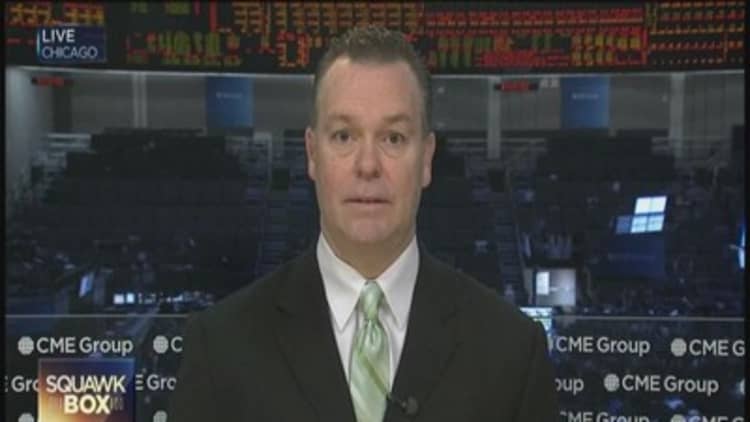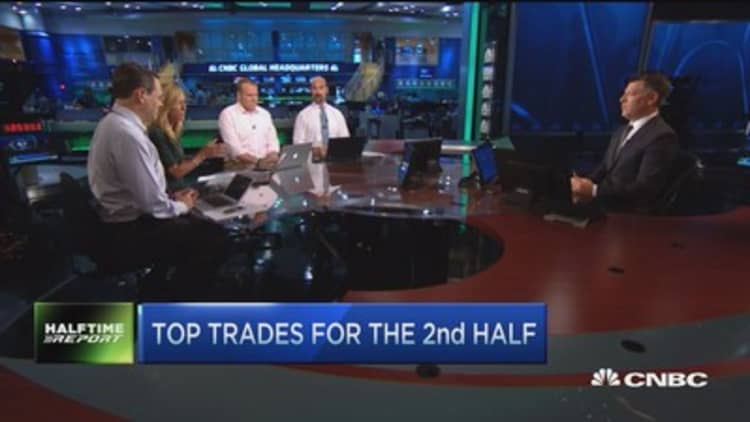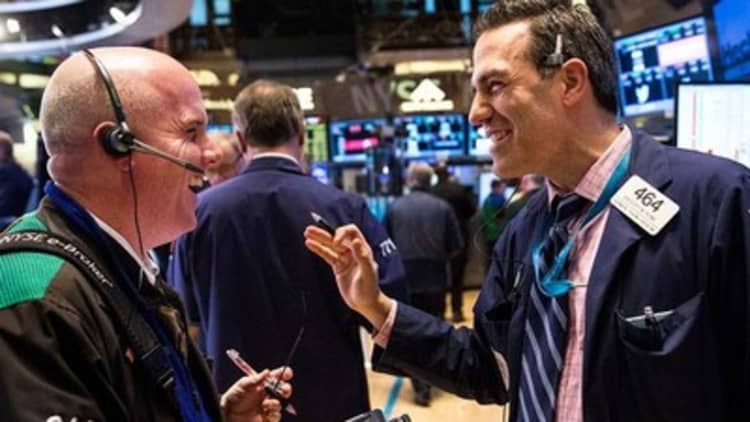


U.S. stocks closed lower on Friday following the Nasdaq's record high as investors eyed developments in the Greece debt negotiations amid quarterly options expirations. (Tweet This)
The major indices ended near their lows of the day. The Dow Jones industrial average extended losses to close about 100 points lower, with Travelers Cos. weighing on the index with a decline of about 2 percent.
It's the "binary effects of options expiration and concern over Greece," said Art Hogan, chief market strategist at Wunderlich Securities.
Friday marked quadruple witching in which volatility often increases in the last hour of trade due to the expiration of options and futures contracts. The major averages remain on track for weekly gains of about 1 percent or more.
Read More
At an emergency summit on Monday, euro zone officials are expected to discuss how to handle a Greek default if no new Greek reform proposals arrive, Reuters reported. Athens has said without further aid, it will be unable to make a 1.5 billion euro ($1.7 billion) debt payment to the International Monetary Fund due on June 30.
Meanwhile, large deposit outflows from Greece have raised concerns that Athens may have to implement capital controls. The European Central Bank expanded emergency funding for Greek banks as savers pulled out 1.2 billion euros in a single day on Friday, bankers said in a Reuters report, but Prime Minister Alexis Tsipras insisted the nation's future in the euro was secure.
"Short of any resolution to the Greece situation—which I don't think is going to happen—we'll kind of waffle here," said Mark Luschini, chief investment strategist at Janney Montgomery Scott.
Read MoreLive blog: All eyes on Greece PM as crisis mounts
Energy stocks fell more than half a percent as one of the greatest decliners in the S&P 500 as oil traded lower on concerns about Greece and increased shale oil supply.
"It's a little bit of a consolidation after the gains yesterday," said Paul Nolte, senior portfolio manager at Kingsview Asset Management. "We're still data-dependent and we're going to postpone any rate increase to later this year."
Stocks rallied about 1 percent on Thursday as investors cheered a dovish Federal Reserve statement and remained hopeful of a deal on Greece.
The Nasdaq Composite closed at a record, surpassing its all-time high set in intraday trade during the tech bubble. The Russell 2000 and S&P midcap 400 index also set records on Thursday and attempted to advance on Friday.
"We think the SPX will follow their lead, with a breakout above minor/final resistance at the May high likely in the days ahead on improved short-term momentum," said BTIG Chief Technical Strategist Katie Stockton. She's watching a support level of 2,106 and resistance at 2,124. The index closed at 2,109.76 on Friday.
The S&P 500 had its best week since April 24. The index posted weekly gains of 0.75 percent, marking the eighth straight week the S&P has stayed within a 1 percent gain or loss. The last time a similar streak occurred was from November 1993 to January 1994.
The U.S. 10-year Treasury yield fell below 2.3 percent to trade near 2.26 percent. The traded near 0.61 percent.
The dollar traded flat, recovering some losses from after the dovish Fed statement. The euro traded near $1.135.
"Bond yields (are) lower in a slight flight-to-quality regarding Greece," said John Lonski, chief economist at Moody's. "The Treasury bond market is (also) adjusting to the Fed's latest policy statement."
Analysts noted that with the release of the central bank's June statement that kept rates at zero, investors will focus on the nonfarm payrolls report due in early July and the beginning of second quarter earnings reports.
"Between now and then, the Greece issue and other issues in the U.S. such as the Supreme Court decision on affordable care will move markets," said David Kelly, chief global strategist at JPMorgan Funds. "I don't think we can say anything about small movements. I think markets are still dominated by uncertainty (about the Fed and Greece)."
San Francisco Fed President John Williams said he sees a rate liftoff this year. He added the Federal Reserve should probably hike rates twice this year if economic data comes in as expected.
Williams is the first Fed official to speak after the conclusion of the FOMC meeting at which the central bank lowered its growth forecasts but said the economy would likely be strong enough to withstand a rate hike this year.
Cleveland Fed President Loretta Mester told reporters the economy could deal with a 25 basis point rate hike right now, Reuters said. Mester is an alternate member of the Federal Open Market Committee.
Her prepared remarks did not comment on monetary policy or give economic forecasts. Mester said in a Reuters report the slow U.S. economic recovery exacerbated the financial hardships long faced by some low- and middle-income Americans.
In Asia, Japan's Nikkei closed almost 1 percent higher to above the psychologically key level of 20,000. European stocks also ended mostly higher despite uncertainty over Greece.
However, the Shanghai Composite tumbled 6.4 percent for its worst weekly decline in 7 years with property and banking stocks leading the index lower.
Bruce McCain, chief investment strategist at Key Private Bank, has a favorable outlook on Japan and the euro zone while remaining overweight on the United States.
"We monitor fundamentals in the market trend. (While it) hasn't been strongly positive, no sign market's really rolling over here," he said.
Read MoreEarly movers: HSY, RHT, SWHC, STT, CAG, GILD & more
Macerich dipped more than 7 percent on Friday following reports that mall operator rival Simon Property was selling a 3.6 percent stake, months after its failed takeover bid.
ConAgra closed up nearly 11 percent at a record after Jana Partners disclosed a 7.2 percent stake in the stock late Thursday and planned to nominate directors to the food-maker's board. Campbell Soup and Pinnacle Foods also traded at highs.
The Dow Jones Industrial Average closed down 99.89 points, or 0.55 percent, at 18,015.95, with Travelers Cos the greatest decliner and Home Depot, Nike and Caterpillar the only advancers.
The closed down 11.25 points, or 0.53 percent, at 2,109.99, with utilities leading all 10 sectors lower
The Nasdaq closed down 15.95 points, or 0.31 percent, at 5,117.00.
The CBOE Volatility Index (VIX), widely considered the best gauge of fear in the market, traded near 13.
About three stocks declined for every two advancers on the New York Stock Exchange, with an exchange volume of about 1.8 billion and a composite volume of 4.2 billion in the close.
High-frequency trading accounted for 40 percent of June to date's daily trading volume of about 5.9 billion shares, according to TABB Group. During the peak levels of high-frequency trading in 2009, about 61 percent of 9.8 billion of average daily shares traded were executed by high-frequency traders.
Crude oil futures ended down 84 cents at $59.61 a barrel on the New York Mercantile Exchange. Gold futures settled down 10 cents at $1,201.90 an ounce.
—CNBC's Robert Hum contributed to this report.


